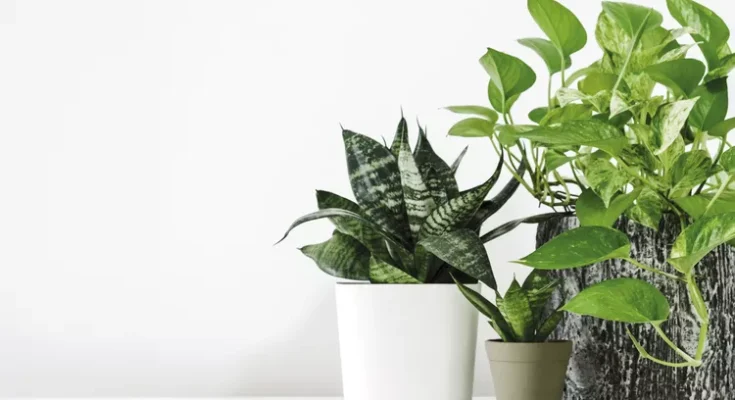Houseplants add a splash of color and style to any space, including your bedroom. But they also create a sense of relaxation and comfort. And while they can’t guarantee sweet dreams, houseplants do make your bedroom instantly feel more like a peaceful sanctuary. In fact, research has found that just being around plants helps us feel happier and less anxious, which isn’t a bad thing when you’re trying to drift off to sleep.
But before you go shopping, consider the type of light your bedroom receives. No plant can survive with zero light, and insufficient light will cause a plant to become scraggly and weak. Because most houseplants are tropical in origin, they need bright, indirect light. A windowsill is fine, but you don’t want direct sunlight, which can burn the foliage. If your room has no windows or is extremely dark, opt for an LED grow light to help your plant thrive.
:max_bytes(150000):strip_icc():format(webp)/GettyImages-968463666-0303eea517944e5aa28814ce5a232357.jpg)
Also, if you’re a new plant parent, more plants die from overwatering than underwatering. The only way to tell if a plant needs watered is to poke your finger into the soil an inch or two (a chopstick works, too) to check moisture levels. If soil sticks to your finger or the chopstick, it’s still wet and probably doesn’t need watered. Wait another day or two and recheck. It’s always better to err on the side of a little too dry than too wet.
Ahead, the best bedroom plants for both new and experienced plant parents:
Aglaonema
:max_bytes(150000):strip_icc():format(webp)/GettyImages-1327837619-6d556a1a4edf4ab1a7db88f1778ff61c.jpg)
- Botanical name: Aglaonema commutatum
- Light: Low, medium, or bright indirect light
- Water needs: Water top few inches of soil feels dry; will tolerate weeks without watering if you’re away (or forget to water!)
If you’re looking for a plant that tolerates all light levels and still looks fabulous, bring home an aglaonema. With its upright form and handsome green leaves that have silvery or pink streaks, aglaonema is an eye-catching plant that needs little care, making it great for beginners or if you’re forgetful about watering.
Golden Pothos
:max_bytes(150000):strip_icc():format(webp)/GettyImages-1283014018-cebf2e8671de47f8814bb5a2a6328612.jpg)
- Botanical name: Epipremnum aureum
- Light: Medium to bright indirect light but can adapt to lower light levels
- Water needs: Water when top inch or two of soil feels dry; does not tolerate soggy soil
Definitely one of the easiest houseplants you can grow, this common pothos has splashes of gold on deep green leaves. It has a vining habit that works well in hanging baskets or when draping over the edges of tables or shelves. It’s about as inexpensive and low-maintenance as you can get.
Snake Plant
:max_bytes(150000):strip_icc():format(webp)/GettyImages-1299027323-f62de092d0974ec2afa878fa600b238c.jpg)
- Botanical name: (Dracaena trifasciata, previously Sansevieria trifasciata)
- Light: Low light but grows faster in medium to bright light
- Water needs: Water when top few inches of soil feel dry to the touch; will tolerate weeks without watering
With a striking architectural form, snake plant— which you still may see called Sansevieria sometimes– has long been a favorite because it’s so forgiving. Many varieties have flat, sword-shaped foliage edged with gray, silver or gold. But you’ll also find types with cylindrical folia.
Philodendron Micans
:max_bytes(150000):strip_icc():format(webp)/GettyImages-1323331631-8c0a9171588b4212a9f486a932c6c932.jpg)
- Botanical name: Philodendron hederaceum var. hederaceum
- Light: Prefers medium to bright indirect light but will adapt to low light
- Water needs: Water when top inch or two of soil feels dry; does not tolerate soggy soil
Philodendrons are a huge category of plants that are very easy to grow. This variety has velvety-textured leaves with various shades of green and pink as new foliage emerges. It’s a lovely and adaptable vining plant that adds color and personality to any space.
Prayer Plant
:max_bytes(150000):strip_icc():format(webp)/GettyImages-1392893401-3e4c11c20ea94f52a8df9d0a9bf8dd35.jpg)
- Botanical name: Maranta leuconeura
- Light: Low, medium, or bright indirect light; protect foliage from direct sunlight
- Water needs: Keep the soil slightly moist, but never sopping wet
The beautiful variegated leaves of this colorful plant fold up at night, as if in prayer. It has a low, spreading form that looks great in hanging baskets or when draping along a tabletop. There are several varieties of prayer plant, but they’re all attractive and easy-care.
Money Tree
:max_bytes(150000):strip_icc():format(webp)/GettyImages-1345463551-87e08828d2204db9b6b6cd6c6cfa02f1.jpg)
- Botanical name: Pachira aquatica
- Light: Bright indirect light
- Water needs: Prefers constant light moisture but tolerates drying out occasionally
Said to bring good luck, this cute miniature tree has shiny hand-shaped leaves. It’s typically sold with several stems braided together. If you tend to overwater plants, money tree is a great option because it grows in wetlands in its native environment.
Lemon Button Fern
:max_bytes(150000):strip_icc():format(webp)/GettyImages-490787296-eb2c8a9b1fd240739efb48ca13ec8b73.jpg)
- Botanical name: Nephrolepis cordifolia ‘Duffii’
- Light: Medium to bright indirect light
- Water needs: Water as soon as the surface feels dry
If you have your heart set on a fern, this is one of the less fussier varieties that won’t annoy you by constantly dropping fronds indoors. With tiny rounded leaflets, it makes an elegant addition to tabletops. Lemon button fern stays fairly small.
ZZ Plant
:max_bytes(150000):strip_icc():format(webp)/GettyImages-1330090790-92864f0d47bb46fcaa9bfd84d3c039b5.jpg)
- Botanical name: Zamioculcas zamiifolia
- Light: Low to medium indirect light
- Water needs: Water when the top few inches of soil feel dry
This sturdy plant is great for beginners because it’s very forgiving and tolerant of less-than-ideal conditions. ZZ has a handsome upright form with glossy green foliage, though other varieties, such as ‘Raven,’ have nearly black leaves. A brand-new variety, ‘Chameleon,’ has new growth that emerges golden before turning green.
Satin Pothos
:max_bytes(150000):strip_icc():format(webp)/GettyImages-1307530713-33e19ad6756d4af59b7f8434df49393b.jpg)
- Botanical name: Scindapsus pictus
- Light: Medium to bright indirect
- Water needs: When the top few inches of soil feel dry to the touch; does not tolerate soggy soil
Despite the common name ‘satin pothos,’ this plant is actually a Scindapsus, which is a different genus. But because it looks so similar to many types of pothos, with heart-shaped leaves and a vining habit, it’s typically marketed as a pothos. The silvery splashes make this plant extra-special, yet it’s as low maintenance as any pothos.
Parlor Palm
:max_bytes(150000):strip_icc():format(webp)/GettyImages-89173417-8b3dcf89bf854093930b142220ded552.jpg)
- Botanical name: Chamaedorea elegans
- Light: Medium to bright indirect light but will adapt to low light
- Water needs: Water when top inch of soil feels dry; does not tolerate soggy soil
If you’re looking for a tropical vibe, a parlor palm is a good choice. It’s much less picky about conditions than many other types of palms and is basically maintenance-free. Keep it out of direct sunlight to prevent scorching its fronds.
Mini Monstera
:max_bytes(150000):strip_icc():format(webp)/GettyImages-1367989441-a1a03c5c2b044c4ea68a66b4d1033dbe.jpg)
- Botanical name: Rhaphidophora tetrasperma
- Light: Bright indirect light
- Water needs: Water when top inch or two of soil feels dry
Often mistaken for a Monstera deliciosa, which is much larger plant in a different genus, this vining plant has cool fenestrations, or cuts, in the leaves for interest and texture. Mini monstera is a fast-growing easy-care plant that thrives when given a moss pole to climb.
Marble Queen Pothos
:max_bytes(150000):strip_icc():format(webp)/GettyImages-1399892193-e3575b6a033b4617bf7c9667f0a787d6.jpg)
- Botanical name: Epipremnum aureum ‘Marble Queen’
- Light: Medium to bright indirect light but can adapt to lower light levels
- Water needs: Water when top inch or two of soil feels dry
You shouldn’t be surprised to see another pothos on the list because it’s such as sturdy and adaptable plant. ‘Marble Queen’ has creamy white variegations, making it especially appealing. Like other types of pothos, it’s a great plant for beginners.



